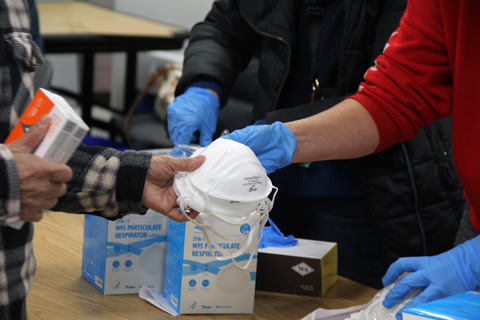Montgomery County Executive Marc Elrich (D) says he plans to use an additional $33 million in reimbursements from the Federal Emergency Management Agency (FEMA) to fund resident services and programs, including food distribution and small business support funding.
The county had already received $117 million in reimbursements for COVID-19 pandemic related expenditures, and has applied for a total of $280 million.
Elrich says he has already written an amendment to the proposed fiscal year 2025 operating budget that designates the $33 million to be spent on specific one-time contributions to certain projects, which he intends to submit to the County Council after the county receives the federal money, which county officials expect to receive in the coming days.
The amendment focuses on one-time expenditures that wouldn’t create deficits or require renewals in future budget processes.
“It’s kind of exciting to fill some gaps we haven’t been able to,” Elrich said during a March 14 press conference introducing his proposed operating budget.
Elrich’s proposals for use of the funding include $7.5 million to create a fund for fast-growing small businesses and $7.1 million toward the county’s Newcomers Program, which supports recent immigrants in the county.
A proposed $3.5 million would go toward the county’s Food Staples program, which provides food to individuals and families in need. The program has faced increased pressure as the number of county residents facing food insecurity has grown.
Elrich’s proposal would also put $500,000 toward creation of a Sexual and Gender Minorities Health Center, which was a recommended outcome of a county Office of Legislative Oversight report that found stark disparities in health care access, and specifically gender-affirming care, for LGBTQ+ county residents.
An additional $300,000 is designated for the county’s growing nonprofit security grants program, which has seen increased demand. The grants allow houses of worship and community organizations at risk of hate crimes to pay for security guards, cameras and other safety measures.
“Look for all of these to be going over to the County Council as soon as the money is in the bank,” county Chief Administrative Officer Rich Madaleno said during the March 14 press conference.
Madaleno cited Earl Stoddard, director of the Montgomery County Office of Emergency Management & Homeland Security, as the reason the county has applied for a total of $280 million in reimbursements since the beginning of the pandemic.
“Look for Earl with a giant ceremonial check walking around, looking for an ATM to put it in,” Madaleno joked.
Stoddard said from the beginning pf the pandemic in 2020 he wanted his department to be on top of documenting COVID-19 spending for future reimbursements. He said it’s a common practice–the county also successfully received money back from FEMA for expenditures related to the 2016 blizzard.
“When we knew this was going to be a national event, it was going to be a federally declared emergency, we knew that we wanted to track costs. So we created a team,” Stoddard said.
The team attempted to track all of the county’s emergency expenditures throughout the COVID-19 pandemic. In general, the department was able to keep track of most of the emergency spending, according to Stoddard. However, some expenses were more difficult to document or required greater explanation. Stoddard said he believes the county is still eligible for at least $80 million more in reimbursements.
“Some of the more difficult costs to catalog include our food distribution costs, sheltering costs for when we hotel people … we have to justify all those being COVID-related,” Stoddard said. “And there are some miscellaneous odds and ends around vaccinations late in the process, as well. That explains the remaining dollars that are sort of outstanding.”
Stoddard said the process has been vital to maximize the county’s spending to support residents. However, he said it has been very challenging and time consuming as regulations have changed between the Trump and Biden administrations over the course of the pandemic.
“You record data in such a way in the beginning because that’s what they’re telling you need to do. Then they change the rules of the game halfway through and you have to go back and try and recreate information that you weren’t saving before …. because you were going off with the original guidance,” Stoddard said. “That’s been the most challenging thing and frankly, the reason why it’s taken a lot longer than we anticipated.”



